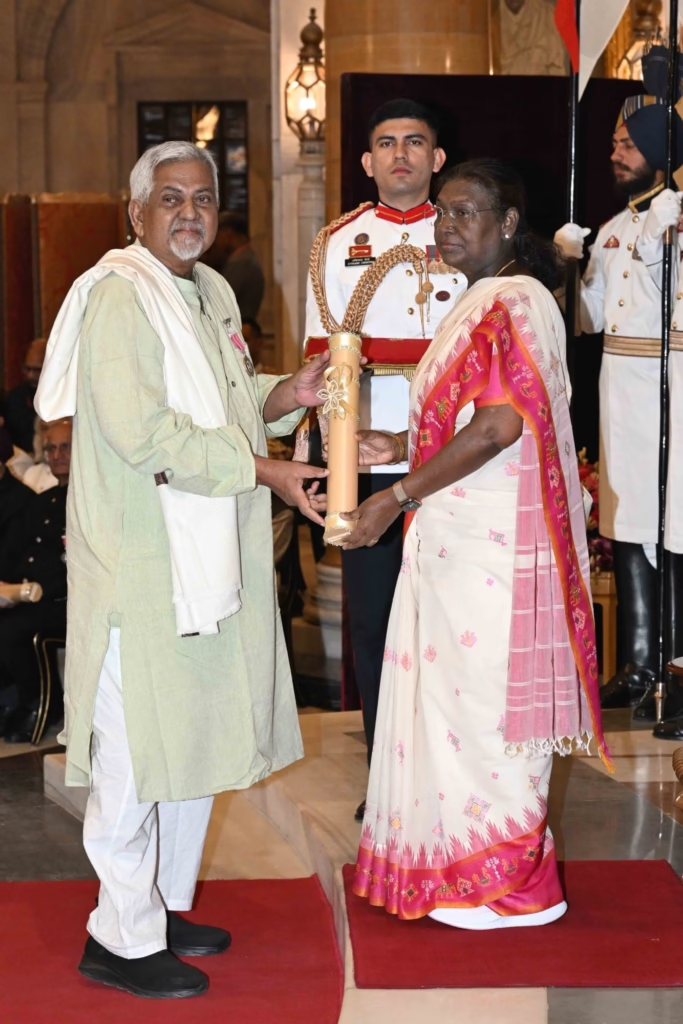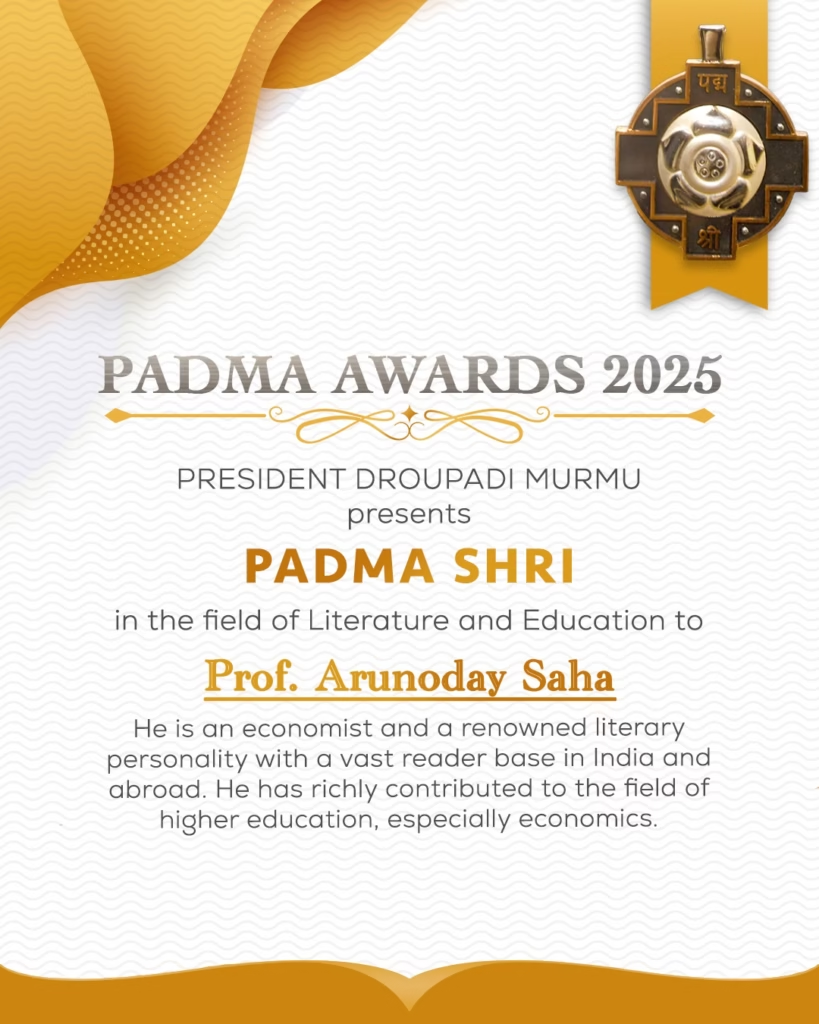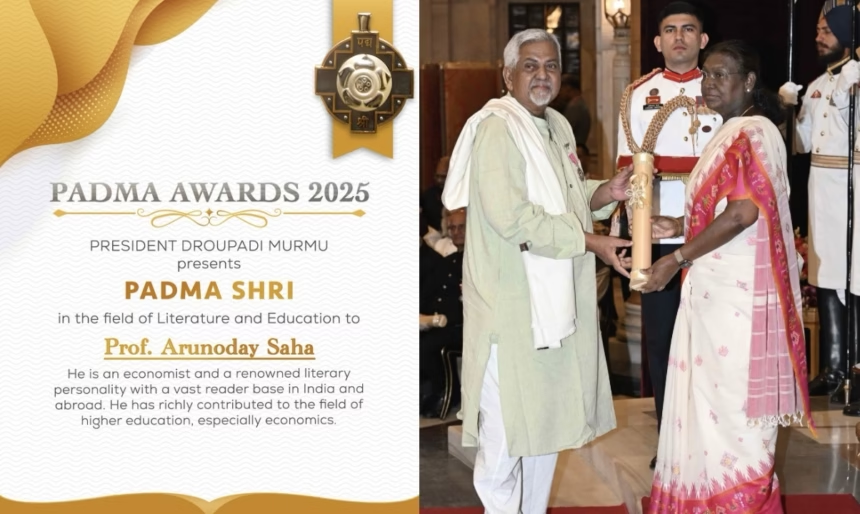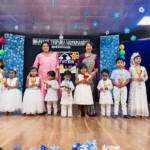Tripura, 29 April 2025: President Droupadi Murmu conferred the Padma Shri, India’s fourth-highest civilian award, upon eminent educationist and former Vice-Chancellor of Tripura University, Professor Arunoday Saha, at a ceremony held at Rashtrapati Bhavan on 28 April. He has been honoured for his notable contributions in the fields of literature and education.
Tripura Chief Minister Professor (Dr.) Manik Saha has extended his heartfelt congratulations to Professor Arunoday Saha on receiving the prestigious award.

Professor Arunoday Saha, a distinguished Indian academic, economist, writer, and politician from Agartala, Tripura, has left an indelible mark on education, literature, and public service. His multifaceted career, spanning over five decades, reflects a rare blend of intellectual rigor, creative expression, and societal commitment. Recognized with the prestigious Padma Shri in 2025, Saha’s journey is a testament to his dedication to advancing knowledge and culture in India’s northeastern region. This article explores his remarkable work history, highlighting his contributions and legacy.

Early Beginnings and Academic Foundations:
Born in 1948 in Bishalgarh, Tripura, into a business family, Arunoday Saha’s early life was rooted in modest circumstances. His passion for learning led him to pursue higher education at some of India’s most esteemed institutions. After completing his Bachelor’s degree at Presidency College, Kolkata, and a Master’s degree in Economics from Calcutta University, Saha ventured abroad to earn a PhD in Economics from Utah State University.
This global academic exposure equipped him with a deep understanding of economic theory and its applications. Saha’s professional journey began humbly as a school teacher in Tripura, where he ignited young minds with his enthusiasm for knowledge. His early teaching experience laid the foundation for a lifelong commitment to education, setting the stage for his later academic and administrative roles.
A Stalwart in Higher Education:
Professor Saha’s academic career flourished as he joined various government colleges in Tripura, where he taught economics with a focus on making complex concepts accessible to students. His ability to bridge theoretical economics with regional issues earned him respect among peers and students alike. Later, he transitioned to Tripura University, where he took on significant academic responsibilities, shaping the institution’s intellectual landscape.
In 2007, Saha achieved a milestone when he was appointed the first Vice-Chancellor of Tripura University, following its elevation to a central university. Serving until his retirement in 2013, he played a pivotal role in transforming the university into a hub of research and learning.
Under his leadership, Tripura University expanded its academic offerings, fostered interdisciplinary research, and strengthened its role as a beacon of education in Northeast India. His tenure is remembered for its emphasis on inclusivity and innovation, ensuring that students from diverse backgrounds had access to quality education.
A Literary Luminary:
Beyond academia, Professor Saha has made significant contributions to Bengali literature, showcasing his versatility as a thinker and writer. A prolific author, he has penned ten books, primarily in Bengali, with some works translated into Hindi and Assamese. His writings, which span essays, stories, and reflections, have appeared in numerous journals and newspapers, resonating with readers for their depth and sensitivity. Saha’s literary pursuits are deeply personal, reflecting his belief in literature as a medium for exploring human experiences and societal challenges.
Despite his academic focus on economics, he has often described literature as his true calling, a space where he can express his innermost thoughts and connect with a broader audience. His ability to balance scholarly rigor with creative expression has earned him a unique place in Tripura’s cultural landscape.
Political Engagement and Public Service:
Professor Saha’s commitment to societal progress extended into the political arena. A member of the Indian National Congress, he carried forward his family’s legacy of association with the party.
In 2014, Saha contested the Lok Sabha elections from the West Tripura Parliamentary Constituency as a Congress candidate. Though an unexpected foray into electoral politics, his candidacy reflected his desire to serve the people of Tripura on a larger platform. His political involvement underscored his belief in using knowledge and leadership to address regional and national issues.
Honors and Legacy:
Professor Saha’s contributions have not gone unnoticed. In 2023, he was honored with the Tripura Vibhushan Award for his transformative work in education. The pinnacle of his recognition came in 2025, when he was conferred the Padma Shri, India’s fourth-highest civilian honor, for his outstanding contributions to literature and education. Presented by President Droupadi Murmu on April 28, 2025, at Rashtrapati Bhavan, the award celebrated Saha’s lifelong dedication to advancing knowledge and culture.
Tripura’s Chief Minister, Manik Saha, and other leaders lauded his achievements, noting his role as an inspiration for future generations. The Padma Shri not only honors Saha’s individual accomplishments but also highlights the growing recognition of Northeast India’s contributions to the nation’s intellectual and cultural fabric.
A Lasting Impact Professor:
Arunoday Saha’s career is a remarkable tapestry of academic excellence, literary creativity, and public service. From his early days as a school teacher to his tenure as Vice-Chancellor and his literary and political endeavors, Saha has consistently demonstrated a commitment to uplifting his community and beyond. His work has enriched Tripura’s educational and cultural spheres, while his writings continue to inspire readers across linguistic boundaries.
As a Padma Shri recipient, Professor Saha stands as a beacon of intellectual and moral integrity, proving that dedication to knowledge and service can create a lasting legacy. His journey encourages us to pursue excellence in our chosen fields while remaining deeply connected to our roots and responsibilities.










